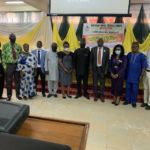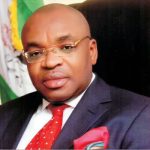Members of the House of Representatives and other stakeholders drawn from the academia and Civil Society Organisations (CSOs), on Wednesday, warned against the militarisation of election processes, ahead of the 2023 general elections.
The stakeholders who gave the charge at the Dialogue on ‘Election security and inclusive Citizens’ participation in Nigeria’, organised by the National Institute for Legislative and Democratic Studies (NILDS) with the support of Westminster Foundation for Democracy.
In her address, Chairman, House Committee on Electoral Matters, Hon Aisha Dukku argued that low voters’ turnout during elections in Nigeria resulted from voter apathy and insecurity.
She, however, assured that the new amendments in the Electoral Bill, 2021 which will soon be transmitted to President Muhammadu Buhari for assent, has addressed various challenges bedevilling the country’s electoral processes.
“That is why the House of Representatives Committee on Electoral Matters embarked on the electoral law because the 9th Assembly realized that the amendment of the law will bring about the needed security that not only the election body, INEC desired in the movement of both material and personnel but also the citizens of the country need to participate in the election of the leaders of the country.
“In the amendment, there are 16 sections that deal with violence and of course it’s not going to be the usual thing we see in 2023 because punitive have also been taken care of in the new bill, and so the security agents themselves have a role to play in enforcing and making sure that both personnel and material are safe, including punishing the culprits because whatever the election body wants to do, it cannot punish anybody because INEC doesn’t have any policeman, it is the security agents that are there that will be on the ground to catch those that are causing the mayhem,” she observed.
While urging Nigerian youths to shun any form of inducement to be engaged as touts during elections, he said:
“Youths are used by some politicians because I do not use the youths to cause violence but in doing that they are also disenfranchised because the moment they cause mayhem, they will not be able to cast their votes, because so many of them are over 18 years even though they are the ones being used to cause violence.
“And let me also say that in the new arrangement the youths have a big role to play because once they say ‘No’ to violence that is the end of it all. And we always urge them to say to any politicians that tell you to come and call violence, tell that politicians, ‘please bring your son or daughter to lead us and then we will go and cause mayhem’.
“We always advise them as mothers that this is the best way to go about it. If I want that election to be disrupted, let me be the first to bring my son, or my daughter or my brother or my sister to lead the other youths. And in that way we will see who will bring his son or her son or sister or brother to cause mayhem,” she noted.
On his part, NILDS Director-General, Professor Olanrewaju Suleiman, who underscored the importance of credible elections, tasked the political class as well as political gladiators to conduct themselves properly during the elections as part of efforts aimed at stemming the spate of violence.
While noting that the proliferation of small arms and light weapons is indicative of the need to be cautious, the former Minister of National Planning, observed that the low voters’ turnout in the just concluded Anambra State gubernatorial election was not a good story to tell, hence stressed the need to put in place necessary modalities and measures to avoid such in subsequent elections.
While stressing the need to constructively engage Nigerian youths, he warned against over-militarisation of elections.
In his remarks, Country Representatives of Westminster Foundation for Democracy, Mr Adebowale Olorunmola who described as one of the poorest countries with low voters’ turnout, frowned at the decline in the rate of voters turnout of 35 per cent in the 2019 election which he described as lowest in the West African subregion, and less than 10 per cent of over 11 million accredited voters who turnout during the just concluded Anambra governorship election.
In his intervention, Chairman, House Committee on Defence, Hon Babajimi Benson, underscored the need for deployment of technology in the view to improve the country’s electoral system.
On the Anambra election, Hon. Benson who noted that the way the candidates emerged was rancorous stressed the need to investigate the internal democracy of all the political parties as well as the process that led to the choice of the Candidates considering the low voters’ turnout below 10 per cent of the 11 million accredited voters.
While describing technology as the game changer from the old electoral system, he argued that: “if we allow things to grow and the transmission of election results, nurture and improve on it, we will have elections that we truly deserve; an election that will be devoid of security personnel.”
Hon. Benson further noted that: “it starts with the electoral process whereby the candidates emerge. If votes are seen to be free and fair, without and tide or interruption whether judicial, whether influenced by the godfather, the voter apathy will be extremely low, voters participation will be very high.”
While sharing his experience, Director General of Nigerian Army Resource Centre, Major General G. A. Wahab tasked the judiciary on the need to dispense with various cases, noting that “somewhere along the line the judiciary has so much to do in this particular instance. Even when the law enforcer arrests these people they will take them to court and nothing happens, we are encouraging impunity all over the federation. That is part of the problems we have, when cases get to court and it takes 10 years to resolve such a case, we are encouraging electoral violence.”
He explained that the Nigerian Army Resources Centre embarked on study of elections in India, where elections took place every Saturday within a month, “nobody was observing anybody because they’ve built trust over time.”
While responding to the question on how to ensure the safety of election materials and personnel, he argued that the “military has no business in ensuring the security of election materials if the political space is non-violent.”
According to him, measures should be put in place to encourage various security agencies such as Nigeria Security and Civil Defence Corps (NSCDC) by upgrading its standard of performance, just as he underscored the need for early planning vis-à-vis the eminent problems observed during the previous elections.
YOU SHOULD NOT MISS THESE HEADLINES FROM NIGERIAN TRIBUNE
Viral Voice Note On WhatsApp Billing False
Claim: A viral WhatsApp voice note, purportedly made by the director and CEO of WhatsApp, claims users will have to start paying for WhatsApp services.
Verdict: The viral WhatsApp voice note claim is a hoax. The content is not new and has been circulated as a broadcast message several times in the past.
WATCH TOP VIDEOS FROM NIGERIAN TRIBUNE TV
- Let’s Talk About SELF-AWARENESS
- Is Your Confidence Mistaken for Pride? Let’s talk about it
- Is Etiquette About Perfection…Or Just Not Being Rude?
- Top Psychologist Reveal 3 Signs You’re Struggling With Imposter Syndrome
- Do You Pick Up Work-Related Calls at Midnight or Never? Let’s Talk About Boundaries







